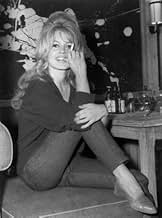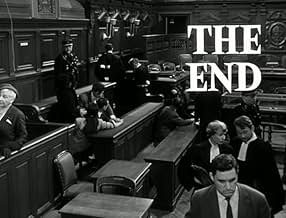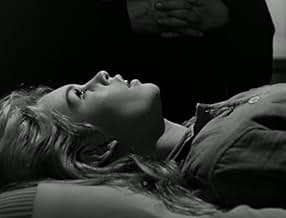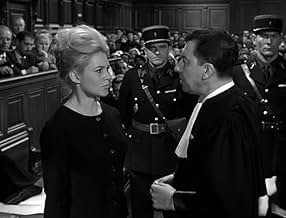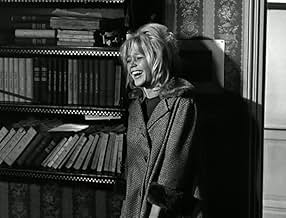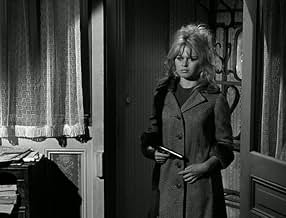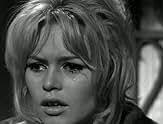IMDb रेटिंग
7.6/10
4.9 हज़ार
आपकी रेटिंग
अपनी भाषा में प्लॉट जोड़ेंA liberated small-town girl stands on trial to determine whether she killed her lover in a crime of passion or in premeditation.A liberated small-town girl stands on trial to determine whether she killed her lover in a crime of passion or in premeditation.A liberated small-town girl stands on trial to determine whether she killed her lover in a crime of passion or in premeditation.
- 1 ऑस्कर के लिए नामांकित
- 3 जीत और कुल 2 नामांकन
Barbara Sommers
- Daisy
- (as Barbara Sohmers)
फ़ीचर्ड समीक्षाएं
French sex symbol Brigitte Bardot occasionally alternated her standard titillating vehicles with films of greater substance (though, invariably, she was still required to shed her clothes!) often helmed by a top name within her native cinema – notable examples being Claude Autant-Lara's LOVE IS MY PROFESSION (1958), Julien Duvivier's THE WOMAN AND THE PUPPET (1959; the only one I have not watched, since it seems not to be available in an English-friendly version – but, of course, I am familiar with the three other adaptations of the Pierre Louys source material, as well as owning the novel itself!), the film under review (sharing disc space with the first-mentioned title on the copy I watched, after acquiring one on which the English subtitles did not work – that said, even here, translation for a slew of dialogue at a time is intermittently skipped – but, then, these are burnt-in on the print obtainable via "You Tube"!), Jean-Luc Godard's CONTEMPT (1963) – unquestionably the finest of the lot – and Louis Malle's A VERY PRIVATE AFFAIR (1962), VIVA MARIA! (1965) and the "William Wilson" episode from SPIRITS OF THE DEAD (1968). As for director Clouzot, this was his last mainstream film – since his next, "Inferno" (begun in 1964), would be aborted due to his poor health and a subsequent one, LA PRISONNERE (1968), was perhaps too 'specialized' (read: extreme) to cater for other than 'underground' audiences! For the record, I still need to watch his MANON (1949) and LES ESPIONS (1957) from the ones I own.
THE TRUTH – included in the all-time top 3,000 movies ranked by the "Wonders In The Dark" website – was the only title involving either to be nominated for the Best Foreign Language Film Oscar: incidentally, it is preceded by the Columbia logo and, apparently, was simultaneously shot in English as per contemporary posters!; for what it is worth, the film deservedly missed out to Ingmar Bergman's beautifully stark parable THE VIRGIN SPRING (1960) – even if they actually emerged joint winners at the Golden Globes! Anyway, what we have here is the trial of a crime of passion (with the star herself in the dock), the backstory of which is then seen in flashback – triggered off by the interrogations of various witnesses. Clouzot managed to rope in an impressive supporting cast for his plethora of characters: Charles Vanel as Bardot's practiced Defense Counsel, Paul Meurisse as the showy Prosecutor – incidentally, both these actors had already appeared together for Clouzot in one of his greatest works, DIABOLIQUE (1955) – and youngsters Sami Frey and Jacques Perrin among the uninhibited (what else?) protagonist's numerous lovers, the former being also the victim in the case.
The director's renowned clinical eye for detail is well in evidence throughout – but the film's two sections do not necessarily jell in this particular instance (perhaps tellingly, the 122-minute movie had as many as six scriptwriters assigned to it!). The narrative proper, then, seems to belong to the 'wasted youth' trend kickstarted by Federico Fellini's I VITELLONI (1953); indeed, despite their highbrow aspirations (musician Frey juggles a relationship with Bardot and her 'saintly' elder sister, all the while attempting to set up his own orchestra!), these singularly colourless personages come across as low-lifes more than anything else: the crime itself, followed immediately by the heroine's attempted suicide, is easily the standout here. Conversely, the backhanded tactics prevalent in the over-crowded courtroom lend much cynical enjoyment – thus countering the necessarily static nature of the cinematography during these sequences.
Still, the film is considered as the one in which the star gave her best performance (she even won the Italian equivalent of the Oscar for it as Best Foreign Actress): though the events leading up to the night of the crime and where the real guilt lay (hence the title) are hotly debated by both sides, it is inconceivable to accuse Frey (who could hardly be blamed for lusting after Bardot) over her (whose feelings for him – whether genuine or merely to spite her "square" sibling – are never properly defined) which is perhaps why the trial ends abruptly as it does! In retrospect, the movie can be seen to have much in common with the afore-mentioned "Inferno" – whose troubled shoot was delineated in a feature-length documentary released in 2009 (after Claude Chabrol had already impressively refashioned Clouzot's original script for his own 1993 effort L'ENFER).
THE TRUTH – included in the all-time top 3,000 movies ranked by the "Wonders In The Dark" website – was the only title involving either to be nominated for the Best Foreign Language Film Oscar: incidentally, it is preceded by the Columbia logo and, apparently, was simultaneously shot in English as per contemporary posters!; for what it is worth, the film deservedly missed out to Ingmar Bergman's beautifully stark parable THE VIRGIN SPRING (1960) – even if they actually emerged joint winners at the Golden Globes! Anyway, what we have here is the trial of a crime of passion (with the star herself in the dock), the backstory of which is then seen in flashback – triggered off by the interrogations of various witnesses. Clouzot managed to rope in an impressive supporting cast for his plethora of characters: Charles Vanel as Bardot's practiced Defense Counsel, Paul Meurisse as the showy Prosecutor – incidentally, both these actors had already appeared together for Clouzot in one of his greatest works, DIABOLIQUE (1955) – and youngsters Sami Frey and Jacques Perrin among the uninhibited (what else?) protagonist's numerous lovers, the former being also the victim in the case.
The director's renowned clinical eye for detail is well in evidence throughout – but the film's two sections do not necessarily jell in this particular instance (perhaps tellingly, the 122-minute movie had as many as six scriptwriters assigned to it!). The narrative proper, then, seems to belong to the 'wasted youth' trend kickstarted by Federico Fellini's I VITELLONI (1953); indeed, despite their highbrow aspirations (musician Frey juggles a relationship with Bardot and her 'saintly' elder sister, all the while attempting to set up his own orchestra!), these singularly colourless personages come across as low-lifes more than anything else: the crime itself, followed immediately by the heroine's attempted suicide, is easily the standout here. Conversely, the backhanded tactics prevalent in the over-crowded courtroom lend much cynical enjoyment – thus countering the necessarily static nature of the cinematography during these sequences.
Still, the film is considered as the one in which the star gave her best performance (she even won the Italian equivalent of the Oscar for it as Best Foreign Actress): though the events leading up to the night of the crime and where the real guilt lay (hence the title) are hotly debated by both sides, it is inconceivable to accuse Frey (who could hardly be blamed for lusting after Bardot) over her (whose feelings for him – whether genuine or merely to spite her "square" sibling – are never properly defined) which is perhaps why the trial ends abruptly as it does! In retrospect, the movie can be seen to have much in common with the afore-mentioned "Inferno" – whose troubled shoot was delineated in a feature-length documentary released in 2009 (after Claude Chabrol had already impressively refashioned Clouzot's original script for his own 1993 effort L'ENFER).
While the title might sound familiar to some hard-core fans, there are chances that many potential lovers will never have the opportunity to find this masterful courtroom drama on TV or DVD.
Indeed, the truth is that Henri-George Clouzot's film of the same name has been sentenced to decades of cinematic oblivion, 7 reviews on IMDb says enough. And the injustice is even more cruel because the movie stands alone as a masterpiece of the genre in a period full of gripping courtroom dramas such as "12 Angry Men", "Anatomy of a Murder", "Judgment at Nuremberg" or "Inherit the Wind" where the verdict mattered less than the quest for truth it initiated and the statements it spoke about the impact of human perceptions in the exercise of justice.
This is why the main question in "The Truth" is not 'who killed', not even 'how', but 'why?', the film takes place during the trial ensuing the murder of Gilbert Tellier, Sami Frey as a talented, handsome and ambitious conductor by his beautiful girlfriend, Dominique Marceau, who tried to kill herself right after. Dominique is played by a 25-year old Brigitte Bardot, in a breakthrough dramatic performance, that elevated her status to the most promising actress of her generation rather than a one-dimensional bimbo.
Yet Bardot's sex-appeal is still significant to the story as Clouzot intelligently exploits it to highlight the sulfurous past of a young idle girl who used her body as an asset, to live without working, without prostituting herself either. Indeed, Dominique Marceau isn't the typical slut: there is in her attitude something that nonchalantly confines to pathos, embodying the unease of the 60's youth, being in her own feminine and naughty way, a sort of rebel without a cause. And the intent of Clouzot is less to make a social commentary but to explore the different facets of a seemingly obvious personality.
The trial becomes the setting for a gripping character study, revisiting the life of Dominique Marceau before the killing from the perspective of two different counselors, played by two giants. Paul Meurisse denounces Dominique's laziness, the jealousy she always felt toward her more studious sister Annie, and a bunch of former lovers come to belie her faithfulness and love for Tellier, whom she murdered by vengeance, because she couldn't stand his relationship with Annie. As for her suicidal attempts, there were calculated acts since she was always sure someone would come at time to save her.
On the other side, Dominique's lawyer, played by Charles Vanel, tends to demonstrate that the murder was a passioned crime, an act of desperation from a tormented woman, as Dominique truly loved Gilbert and couldn't imagine life without him. One of the film's greatest delights is the verbal duel between the two actors, and their interactions that remind some of the great courtroom dramas, when two respectable adults, even friends, become visceral enemies during the trial, James Stewart and George C. Scott, Spencer Tracy and Frederic March or more recently, Tom Cruise and Kevin Bacon.
The interest of the Meurisse/Vanel antagonism is to keep a shadow of mystery around Bardot's real personality, a villainous killer or a woman victim of her passion. And as the story progresses, Dominique's portrait, originally painted in black and white reveals many shades of gray while her victim, the good-hearted Tellier becomes less and less innocent. The story opens in Paris where Bardot embodies the youth's ennui, living like a sort of social parasite whose only excuse is to use her body as thin consolation. Yet, she can't be a slut because she's totally unaware of conventions, she's beyond them, and doesn't even feel guilty.
Naturally, the inevitable happens, Tellier, Annie's friend falls in love with the sensual provincial girl. It's the typical love at first sight, but it's handled in a very talented way by Clouzot who's a real craftsman when it comes to human emotions. Hefirst meets Dominique when she's lying naked, topless in her bed, swinging her beautiful behind to some mambo music, she incarnates the luscious fruit, she's everything her sister is not, that's what makes her so obsessively desirable. Then the romance between Marceau and Tellier turns into a series of passion, deception, treachery and arguments like only a director like Clouzot could have painted without falling in a sentimental or either Manichean trap.
And as we get closer to the murder, we understand the roots of Dominique's behavior and her suicidal attempts carry deepest significances, rather than an act of despair, they crystallize the vulnerability of a girl that tries to find her place in society, torn between the true love of Gilbert and a sort of paradoxical innocence that raises above her lust. It feels strange but when you keep an eye on Bardot's performance, you'd think twice before calling a girl, a slut. Bardot was the perfect choice for the role and her breakdown transcends the sensual contours of her delicious body and can touch any soul.
After watching the film, I guess the reason of its lack of notoriety is the fact that H-G Clouzot is renowned for several masterpieces of the thriller genre, blending it with elements of horror, mystery or police procedural, therefore, a movie like "The Truth" comes too late in his filmography and doesn't meet the same recognition than the acclaimed "The Crow", "Quai des Orfèvres", not to mention the classic "Wages of Fear" and"Diaboliques". But on its own, it's a magnificent exploration of the human soul, a masterfully written courtroom drama, and still a Clouzot's film with its dark and pessimistic undertones, and the eternal cloud of ambiguity that envelops the character's personalities.
Bardot lived a romance with Frey after the film, and she was so affected by the experience that like her character, she tries to commit suicide, if a film haunted its own actors, it gives you an idea about the psychological impact it might have on you
Indeed, the truth is that Henri-George Clouzot's film of the same name has been sentenced to decades of cinematic oblivion, 7 reviews on IMDb says enough. And the injustice is even more cruel because the movie stands alone as a masterpiece of the genre in a period full of gripping courtroom dramas such as "12 Angry Men", "Anatomy of a Murder", "Judgment at Nuremberg" or "Inherit the Wind" where the verdict mattered less than the quest for truth it initiated and the statements it spoke about the impact of human perceptions in the exercise of justice.
This is why the main question in "The Truth" is not 'who killed', not even 'how', but 'why?', the film takes place during the trial ensuing the murder of Gilbert Tellier, Sami Frey as a talented, handsome and ambitious conductor by his beautiful girlfriend, Dominique Marceau, who tried to kill herself right after. Dominique is played by a 25-year old Brigitte Bardot, in a breakthrough dramatic performance, that elevated her status to the most promising actress of her generation rather than a one-dimensional bimbo.
Yet Bardot's sex-appeal is still significant to the story as Clouzot intelligently exploits it to highlight the sulfurous past of a young idle girl who used her body as an asset, to live without working, without prostituting herself either. Indeed, Dominique Marceau isn't the typical slut: there is in her attitude something that nonchalantly confines to pathos, embodying the unease of the 60's youth, being in her own feminine and naughty way, a sort of rebel without a cause. And the intent of Clouzot is less to make a social commentary but to explore the different facets of a seemingly obvious personality.
The trial becomes the setting for a gripping character study, revisiting the life of Dominique Marceau before the killing from the perspective of two different counselors, played by two giants. Paul Meurisse denounces Dominique's laziness, the jealousy she always felt toward her more studious sister Annie, and a bunch of former lovers come to belie her faithfulness and love for Tellier, whom she murdered by vengeance, because she couldn't stand his relationship with Annie. As for her suicidal attempts, there were calculated acts since she was always sure someone would come at time to save her.
On the other side, Dominique's lawyer, played by Charles Vanel, tends to demonstrate that the murder was a passioned crime, an act of desperation from a tormented woman, as Dominique truly loved Gilbert and couldn't imagine life without him. One of the film's greatest delights is the verbal duel between the two actors, and their interactions that remind some of the great courtroom dramas, when two respectable adults, even friends, become visceral enemies during the trial, James Stewart and George C. Scott, Spencer Tracy and Frederic March or more recently, Tom Cruise and Kevin Bacon.
The interest of the Meurisse/Vanel antagonism is to keep a shadow of mystery around Bardot's real personality, a villainous killer or a woman victim of her passion. And as the story progresses, Dominique's portrait, originally painted in black and white reveals many shades of gray while her victim, the good-hearted Tellier becomes less and less innocent. The story opens in Paris where Bardot embodies the youth's ennui, living like a sort of social parasite whose only excuse is to use her body as thin consolation. Yet, she can't be a slut because she's totally unaware of conventions, she's beyond them, and doesn't even feel guilty.
Naturally, the inevitable happens, Tellier, Annie's friend falls in love with the sensual provincial girl. It's the typical love at first sight, but it's handled in a very talented way by Clouzot who's a real craftsman when it comes to human emotions. Hefirst meets Dominique when she's lying naked, topless in her bed, swinging her beautiful behind to some mambo music, she incarnates the luscious fruit, she's everything her sister is not, that's what makes her so obsessively desirable. Then the romance between Marceau and Tellier turns into a series of passion, deception, treachery and arguments like only a director like Clouzot could have painted without falling in a sentimental or either Manichean trap.
And as we get closer to the murder, we understand the roots of Dominique's behavior and her suicidal attempts carry deepest significances, rather than an act of despair, they crystallize the vulnerability of a girl that tries to find her place in society, torn between the true love of Gilbert and a sort of paradoxical innocence that raises above her lust. It feels strange but when you keep an eye on Bardot's performance, you'd think twice before calling a girl, a slut. Bardot was the perfect choice for the role and her breakdown transcends the sensual contours of her delicious body and can touch any soul.
After watching the film, I guess the reason of its lack of notoriety is the fact that H-G Clouzot is renowned for several masterpieces of the thriller genre, blending it with elements of horror, mystery or police procedural, therefore, a movie like "The Truth" comes too late in his filmography and doesn't meet the same recognition than the acclaimed "The Crow", "Quai des Orfèvres", not to mention the classic "Wages of Fear" and"Diaboliques". But on its own, it's a magnificent exploration of the human soul, a masterfully written courtroom drama, and still a Clouzot's film with its dark and pessimistic undertones, and the eternal cloud of ambiguity that envelops the character's personalities.
Bardot lived a romance with Frey after the film, and she was so affected by the experience that like her character, she tries to commit suicide, if a film haunted its own actors, it gives you an idea about the psychological impact it might have on you
PROG ROCK? The music featured will be familiar to YES fans - this bit of Stravinsky is what they always started their concerts with and that heralding of something outstanding to come is also reflected with Clouzot's thoroughly engrossing masterpiece.
M. Clouzot, although sounding a little like Insp. Clouseau wasn't particularly one for having a few laughs in his pictures. Although this is pretty much laden with wall to wall doom, there are some very human touches and sparks of humour which do make you smile - that makes this two hour plummet into the chasm of inevitable misery much more palatable. What also really makes this palatable and so utterly engaging is Miss Bardot - putting aside her brilliant performance - you could happily watch this whole thing with the sound off just gazing at this perfect young woman .....of course you'd need a good slapping if you did that because you'd be missing out on an extraordinarily realistic and moving acting performances. But such is the allure of this woman and such is the way this film has been crafted.
RUTH ELLIS? Like the sad and sadly true story of Ruth Ellis, the attitudes of the establishment as exemplified in this court are just the same as then. ....Gentleman of the jury, this young woman is not on trial for her shocking dissolute lifestyle or her immortality, she is on trial for murder..... This film's actual murder trial plays second fiddle to this film's real plot: clash of cultures. It's about the brutal conflict between two societies which until recently had hardly been aware of each other's existence. Like matter and anti-matter existing in the same space, although both inhabiting the same city, the established order - thinking of themselves, the pinnacle of civilisation had just discovered the existence of the working class youth.
PRE-CODE CIMEMA? You expect that class ridden sexism and almost laughable chauvinism in those movies from the early thirties. Ruth Chatterton in FEMALE, 1933 declaring that she's only a woman and should never have tried to do a man's job belongs in a distant age, almost a distant planet. This however is a generation later and because they now wear jeans and t shirts rather than evening dresses and top hats, it is sort of 'now' so when you see those antiquated prejudices, they're no longer amusing relics of a bygone age, they're about us so much more shocking.
Overall this is an intelligent and entertaining movie. It sits there in terms of style and quality with ANATOMY OF A MURDER, TWELVE ANGRY MEN and TO KILL A MOCKINGBIRD. It's also great to see Miss Bardot showing what a superb actress she was. Sami Frey is also very impressive as the love-struck young musician.
M. Clouzot, although sounding a little like Insp. Clouseau wasn't particularly one for having a few laughs in his pictures. Although this is pretty much laden with wall to wall doom, there are some very human touches and sparks of humour which do make you smile - that makes this two hour plummet into the chasm of inevitable misery much more palatable. What also really makes this palatable and so utterly engaging is Miss Bardot - putting aside her brilliant performance - you could happily watch this whole thing with the sound off just gazing at this perfect young woman .....of course you'd need a good slapping if you did that because you'd be missing out on an extraordinarily realistic and moving acting performances. But such is the allure of this woman and such is the way this film has been crafted.
RUTH ELLIS? Like the sad and sadly true story of Ruth Ellis, the attitudes of the establishment as exemplified in this court are just the same as then. ....Gentleman of the jury, this young woman is not on trial for her shocking dissolute lifestyle or her immortality, she is on trial for murder..... This film's actual murder trial plays second fiddle to this film's real plot: clash of cultures. It's about the brutal conflict between two societies which until recently had hardly been aware of each other's existence. Like matter and anti-matter existing in the same space, although both inhabiting the same city, the established order - thinking of themselves, the pinnacle of civilisation had just discovered the existence of the working class youth.
PRE-CODE CIMEMA? You expect that class ridden sexism and almost laughable chauvinism in those movies from the early thirties. Ruth Chatterton in FEMALE, 1933 declaring that she's only a woman and should never have tried to do a man's job belongs in a distant age, almost a distant planet. This however is a generation later and because they now wear jeans and t shirts rather than evening dresses and top hats, it is sort of 'now' so when you see those antiquated prejudices, they're no longer amusing relics of a bygone age, they're about us so much more shocking.
Overall this is an intelligent and entertaining movie. It sits there in terms of style and quality with ANATOMY OF A MURDER, TWELVE ANGRY MEN and TO KILL A MOCKINGBIRD. It's also great to see Miss Bardot showing what a superb actress she was. Sami Frey is also very impressive as the love-struck young musician.
Through contemporary eyes, you might be quite surprised, what most of the courtroom did surmise, without any question or compromise, but the flashbacks tell no lies and the romance, sadly, 'meurts'.
10pzanardo
It appears that the outstanding director Henri-George Clouzot was unable to make movies short of being masterpieces. "La Verite" may be defined as the "European Rashomon", and, well aware that my opinion will be considered a sacrilege, I venture to say that Clouzot's film is even better than Kurosawa's celebrated masterpiece. In fact, the essence of both "Rashomon" and "La Verite" lies in the quest of the truth of a story, reconstructed through a sequence of flash-backs.
"La Verite" narrates the trial of the breathtakingly-beautiful-sexy lost girl Dominique (Brigitte Bardot), for the murder of her former boy-friend Gilbert (Samy Frey). Everybody (Dominique herself, her former friends and various lovers, her enemies, notably her own sister, as well as lawyers and prosecutors) states his own version of the facts, but what is the actual truth? To simplify the question: is Dominique just a ruthless killer, or was she a weak, enamored girl, victim of Gilbert's selfishness and bullying? As always in Clouzot's movies, "La Verite" is extremely intense, packed with a profound and uncompromising psychological study. The almost obsessive pace of events gives no break to both the characters and the audience. The script is first-rate, with plenty of cynical sense of humor, in spite of the dramatic facts told.
Brigitte Bardot was a great actress, endowed with an outstanding talent. A careful viewer could easily get it even from BB's performances in minor movies, like, say "Mademoiselle Pigalle". Here, under the sound direction of a genius like Clouzot, she is just sensational in a highly dramatic role. Of course, also the acting by the remainder of the cast is excellent, especially, needless to say, by the legends Charles Vanel and Paul Meurisse, as the two lawyers.
Possibly, the main credit of this fantastic movie lies in a gelid, sarcastic, misanthropic representation of human society. Arguably, this is the trade-mark of Clouzot's style, together with suspense, which here is present but not exasperated like in his other works. The world of the adults is wholly despicable, permeated as they are with hypocrisy, with prejudice and fear, especially in sexual matters, and with sickening cynicism, as masterly represented by the lawyer Paul Meurisse.
However, the youngsters are no better than the adults. They are just fatuous, selfish, conceited loafers, only able to utter pseudo-intellectual chats. As a matter of fact, when Dominique founds herself in dire straits, none of her young friends moves a finger to help her. And Dominique often appears even worse than the others. From some point of view, she might be considered a totally negative character.
So, what's the point of Clouzot? I think that's not an issue. He just shows what he sees; that's the style and the aim of one of the greatest artists in the history of cinema.
"La Verite" is a total masterpiece. It is impossible to be disappointed. Highly recommended.
"La Verite" narrates the trial of the breathtakingly-beautiful-sexy lost girl Dominique (Brigitte Bardot), for the murder of her former boy-friend Gilbert (Samy Frey). Everybody (Dominique herself, her former friends and various lovers, her enemies, notably her own sister, as well as lawyers and prosecutors) states his own version of the facts, but what is the actual truth? To simplify the question: is Dominique just a ruthless killer, or was she a weak, enamored girl, victim of Gilbert's selfishness and bullying? As always in Clouzot's movies, "La Verite" is extremely intense, packed with a profound and uncompromising psychological study. The almost obsessive pace of events gives no break to both the characters and the audience. The script is first-rate, with plenty of cynical sense of humor, in spite of the dramatic facts told.
Brigitte Bardot was a great actress, endowed with an outstanding talent. A careful viewer could easily get it even from BB's performances in minor movies, like, say "Mademoiselle Pigalle". Here, under the sound direction of a genius like Clouzot, she is just sensational in a highly dramatic role. Of course, also the acting by the remainder of the cast is excellent, especially, needless to say, by the legends Charles Vanel and Paul Meurisse, as the two lawyers.
Possibly, the main credit of this fantastic movie lies in a gelid, sarcastic, misanthropic representation of human society. Arguably, this is the trade-mark of Clouzot's style, together with suspense, which here is present but not exasperated like in his other works. The world of the adults is wholly despicable, permeated as they are with hypocrisy, with prejudice and fear, especially in sexual matters, and with sickening cynicism, as masterly represented by the lawyer Paul Meurisse.
However, the youngsters are no better than the adults. They are just fatuous, selfish, conceited loafers, only able to utter pseudo-intellectual chats. As a matter of fact, when Dominique founds herself in dire straits, none of her young friends moves a finger to help her. And Dominique often appears even worse than the others. From some point of view, she might be considered a totally negative character.
So, what's the point of Clouzot? I think that's not an issue. He just shows what he sees; that's the style and the aim of one of the greatest artists in the history of cinema.
"La Verite" is a total masterpiece. It is impossible to be disappointed. Highly recommended.
क्या आपको पता है
- ट्रिवियाDirector Henri George Clouzot pushed his actors and actresses so hard - Sami Frey and Jacques Perrin were about to hit him in the face - that Brigitte Bardot tried to commit suicide after the shooting. She was too much implicated, involved in the Dominique character. She also said that this movie was the only one in her career which she was really proud of.
- भाव
The Prosecuting Attorney: You spent weeks seducing him, didn't you? Weeks!
Dominique's Attorney: Objection! What length of time should she have spent? Is there any legal limit on how long a seduction ought to take?
- कनेक्शनFeatured in The Art of Arts TV: The Single Arts Film (2008)
- साउंडट्रैकL'Oiseau de Feu
Written by Igor Stravinsky
टॉप पसंद
रेटिंग देने के लिए साइन-इन करें और वैयक्तिकृत सुझावों के लिए वॉचलिस्ट करें
- How long is The Truth?Alexa द्वारा संचालित
विवरण
- चलने की अवधि2 घंटे 8 मिनट
- रंग
- पक्ष अनुपात
- 1.66 : 1
इस पेज में योगदान दें
किसी बदलाव का सुझाव दें या अनुपलब्ध कॉन्टेंट जोड़ें


